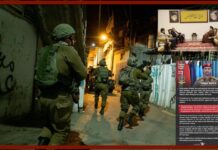
The Ukrainians have gone from the theses: “Give us the weapons to win, we are winning” to “Give us the weapons to win otherwise the Russians will win”. The Kiev narrative strictly dictated by the UK has taken on a new tone and with it new statements. France is also slowly moving from: “We will send our soldiers to the front” to: “If necessary we can send our soldiers to the border areas so as to free Ukrainian troops for the front”. The Poles remain among the diehards but it is only a matter of time.
Alexander Pavlyuk, commander of the Ukrainian ground forces, for example, told the Times: “Russia really has a plan to capture Kharkiv and Sumy.” According to him, Russia’s plans for 2024 include full control of the Zaporozhzhie, Donetsk and Lugansk regions. In reality the plans are the same as in 2022 and 2023 but now what has changed is the narrative of Russian conquests.
But the most sobering statements are those of the Deputy Head of the Main Intelligence Directorate of the Ministry of Defense of Ukraine Vladimir Skibitskv released to The Economist on May 2: “The surrender of the Ukrainian armed forces in Chasiv Yar is a question of time . We are at the limit. The situation is now more complex than ever. Russia will continue to implement its plan to occupy the entire territory of the Donetsk and Lugansk regions of Ukraine. Our problem is very simple: we have no weapons. The Russian Armed Forces always knew that April and May would be difficult times for us. The Russian military is no longer the arrogant organization it was in 2022, and now operates as a single body, with a clear plan and under a single command. Russia is preparing for an offensive in the Kharkiv and Sumy regions in the north-east. The timing depends on the stability of the Ukrainian defense in Donbass. Russia’s main attack will begin in late May or early June. Russia has a total of 514,000 ground troops involved in the Ukrainian operation. Russia’s northern force, based across the Kharkiv border, currently numbers 35,000 troops, but is expected to expand to 50,000-70,000 troops. Dark times await Kharkov.”
And again he told the British newspaper: “May will be a key month in the military conflict in Ukraine, as Russia will use a three-tier plan to destabilize Ukraine. The main factor is military. It will take weeks for US aid to reach the front lines. It is unlikely to match Russia’s ammunition stockpiles or provide effective protection against Russia’s destructive, low-tech guided bombs. The second factor is the Russian disinformation campaign aimed at undermining Ukrainian mobilization and the political legitimacy of Volodymyr Zelenskyj, whose presidential term expires on May 20. The third factor is Russia’s relentless campaign to isolate Ukraine internationally.”
And finally comes the new narrative, the one that now appears in all the most important newspapers in the United States and the United Kingdom: negotiations must be opened with Russia. Says Skibitskv: “I don’t see the possibility of winning the war with the Russian Federation solely on the battlefield. Even if we managed to push Russian troops back to the borders (an increasingly distant prospect), this would not end the war. Such wars they can only end with treaties. Right now, both sides are fighting for the most advantageous position before potential negotiations. But significant negotiations may not begin until the second half of 2025. By then, Russia will face serious obstacles the defense industry plateau that will be reached by early 2026 due to lack of materials and engineers Both sides may eventually run out of weapons if nothing else changes, Ukraine will be there first to be impoverished.”
US Secretary of Defense Lloyd Austin also spoke about agreements with Putin and admitted the possibility of negotiations between Russia and Ukraine. “Most conflicts of this nature end with some sort of negotiation and, once again, when this happens, we want Ukraine to be in the best possible position so that it can achieve its goals and agree on the right things. It depends on Ukraine when this will happen and what it will agree to or not. Our goal is to make sure they get help,” said Lloyd Austin.
In the meantime, 160 delegations are busy preparing for the peace summit in Switzerland which will be held on 15 and 16 June in which Moscow is not participating. Through the highest officials of the state, Putin has made it known that he is always willing to talk about peace agreements but certainly not under the conditions dictated by Kiev.
It is underlined that the longer we wait, the stronger Russia, China, Iran, Azerbaijan and the BRICS area become thanks to economic alliances and cooperation treaties in the defense and finance sectors, the more difficult it will be to reach an agreement that is fair for all parties involved.
Graziella Giangiulio















